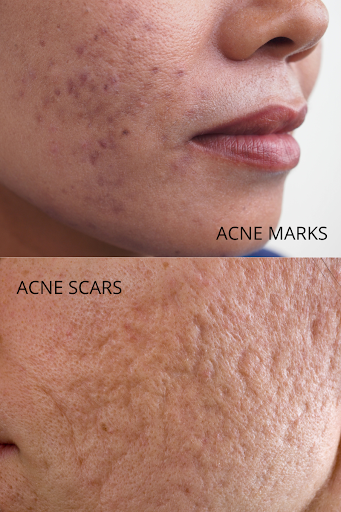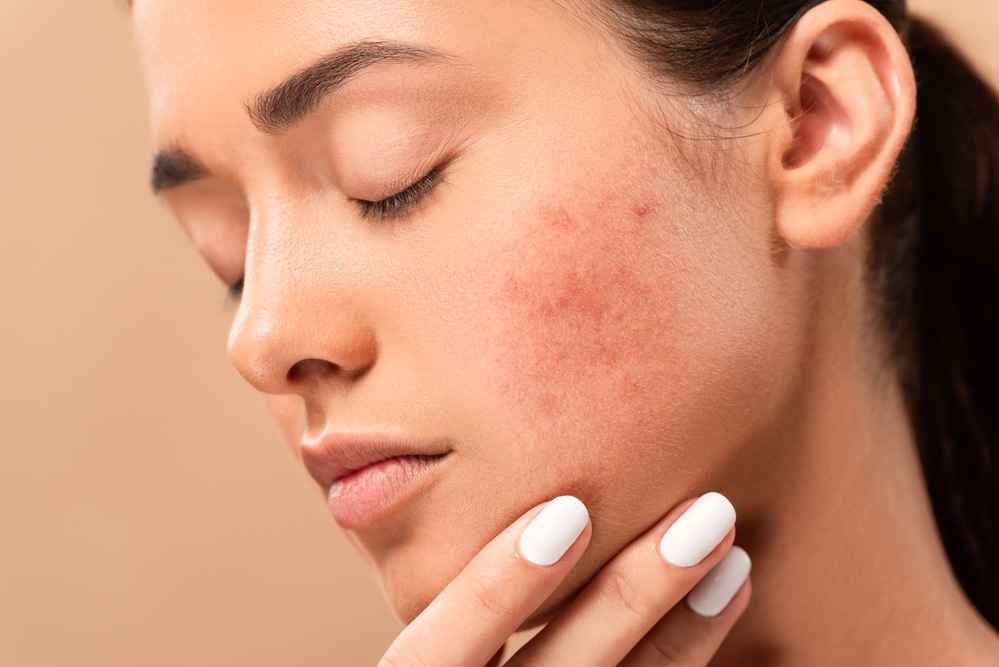What could be more frustrating than finally having your breakout clear up, only to find residual scars or marks left on your once-clear skin? The blemishes left behind from a breakout can come in the form of either an acne scar or acne mark. Understanding the difference between an acne scars vs acne marks can be the key to treating them properly and getting your clear skin back. Keep reading to learn the difference below.

What is an Acne Mark?
An acne mark is a dark spot or discoloration on your skin that is caused by inflammation. When you experience a breakout, your skin will send white blood cells into the bloodstream, which increases blood flow to the injured area. It also sends melanocytes with it, which are the cells that make melanin in your body. It’s the melanocytes that cause dark spots or hyperpigmentation in the form of acne marks left on your skin. Red acne marks are called post-inflammatory erythema, whereas brown acne marks are called post-inflammatory hyperpigmentation. Both will cause discoloration of the skin. Acne marks are flat and tend to fade away over time.
How to Treat an Acne Mark?
To help the acne marks fade faster, there are medical grade skincare options and treatments that can be prescribed to do so.
- Retinoids
- Chemical Peels
- IPL treatments
At-home treatments should be avoided as they tend to irritate the skin and don’t penetrate deeply or safely as needed to produce results.
What is an Acne Scar?
Acne scars are a bit different. Acne scars are irregularities in your skin’s texture after a breakout. These can be raised or indented marks that are typically permanent. When you have a breakout and then pick at your acne, your body will stop the bleeding by sealing damaged blood vessels. Acne scars are caused by an altered wound healing process where either too much or too little collagen is produced. When too much collagen is produced during the wound healing response, it can cause hypertrophic or keloid scars, both of which are rare. More often than not, your skin could produce too little collagen during the wound healing process, which will create indented scars called atrophic scars.
How to Treat Acne Scars
As we mentioned above, acne marks will typically go away over time on their own. It’s acne scars that need to be treated right away to prevent permanent scarring. Here are several treatments we recommend:
- RF Microneedling
- Chemical Peels
- Retinoids
- Dermal Fillers
- Laser Skin Resurfacing
All of the treatment options above should be performed by a certified skin care professional, and never attempted at home by yourself. We also recommend treating acne at the source before exploring how to treat acne scars. If you can’t stop acne at the source, you will be dealing with the after-effects of stubborn acne marks and scars indefinitely.
Find Treatments at SomaSou
SomaSou is Del Ray’s first MedSpa offering services to help our community regain vitality, strength, and confidence in themselves. SomaSou means “your body,” and we give you options to help you feel confident about it. Start your journey by taking an active role in your well-being and schedule a consultation with us today. For more information about products that treat acne, our services and to schedule a treatment, please contact us here.


